
USER MODELING AND USER-ADAPTED INTERACTION
Scope & Guideline
Elevating User Experience Through Cutting-Edge Research
Introduction
Aims and Scopes
- User Modeling Techniques:
The journal explores various user modeling techniques, including data-driven approaches, machine learning, and psychological modeling, to understand user preferences, behaviors, and needs. - Adaptive Systems:
Research on adaptive systems that respond to user context, preferences, and interactions is central. This includes adaptive user interfaces, recommender systems, and personalized learning environments. - Human-Robot Interaction:
The journal highlights studies on human-robot interaction, focusing on how personalization and user feedback can enhance communication and cooperation between humans and robots. - Conversational Interfaces:
A significant focus is on conversational recommender systems, investigating how dialogue and interaction can be tailored to improve user engagement and satisfaction. - Evaluation and User Experience:
The journal emphasizes the importance of evaluating user experience and the effectiveness of adaptive systems, often employing empirical studies to assess user satisfaction and engagement.
Trending and Emerging
- Neuro-Symbolic Approaches:
Emerging research is focusing on neuro-symbolic methods in recommender systems, combining neural networks with symbolic reasoning to enhance knowledge representation and user understanding. - Emotion-Adaptive Systems:
There is a growing trend towards developing systems that can adapt based on users' emotional states, incorporating emotional intelligence into user interactions for personalized experiences. - Federated Learning and Privacy Preservation:
Recent publications indicate an increasing interest in federated learning techniques that allow for collaborative filtering while preserving user privacy, addressing growing concerns about data security. - Context-Aware Recommendations:
The trend towards context-aware recommendation systems is strong, with a focus on integrating contextual information such as time, location, and user activity to enhance personalization. - Explainability in AI Systems:
Research on explainable AI and the justification of recommendations is gaining momentum, reflecting the need for transparency and trust in automated systems.
Declining or Waning
- Traditional Recommender Systems:
Research on traditional collaborative filtering and content-based recommendation methods has decreased as newer, more sophisticated approaches like graph-based and deep learning methods gain traction. - Static User Profiles:
The use of static user profiles for personalization is becoming less common, as dynamic and context-aware models are preferred for better adaptability to changing user needs. - Generic User Interfaces:
There is a noticeable decline in studies focused on generic user interface designs, with a shift towards more adaptive and personalized interface solutions that cater to individual user preferences. - Basic User Feedback Mechanisms:
Research focusing solely on simple feedback mechanisms, such as thumbs up/down or star ratings, appears to be less frequent, with an increasing emphasis on nuanced and context-rich user feedback.
Similar Journals
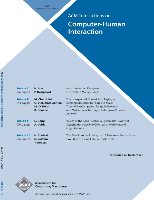
ACM Transactions on Computer-Human Interaction
Bridging the Gap Between Users and TechnologyACM Transactions on Computer-Human Interaction (ISSN: 1073-0516; E-ISSN: 1557-7325) is a prestigious journal published by the Association for Computing Machinery, focusing on the dynamic and rapidly evolving field of Human-Computer Interaction (HCI). With an impressive 2023 impact factor reflecting its high-quality research output, it proudly holds a Q1 ranking in the HCI category on Scopus, positioning it among the top journals in the field. Established in 1994, the journal has been a vital resource for researchers and professionals alike, featuring innovative studies that explore the design, evaluation, and implementation of user interfaces and interactive systems. Its broad scope encompasses various aspects of HCI, including cognitive processes, user experience design, and the social implications of technology. As an essential read for anyone involved in HCI research and practice, the journal is a gateway to advancements that shape the future of human-technology interactions. The journal is accessible to readers globally, and it plays a pivotal role in disseminating knowledge that drives excellence in software design and user interface research.
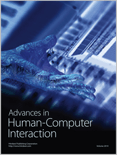
Advances in Human-Computer Interaction
Bridging the gap between humans and technology.Advances in Human-Computer Interaction is a premier peer-reviewed journal published by HINDAWI LTD, dedicated to the exploration of cutting-edge research and innovation in the field of Human-Computer Interaction (HCI). With an ISSN of 1687-5893 and an E-ISSN of 1687-5907, this Open Access journal has been contributing to the scientific community since 2008, offering unrestricted access to critical findings and advancements. Based in Egypt with an address at ADAM HOUSE, 3RD FLR, 1 FITZROY SQ, LONDON W1T 5HF, ENGLAND, it occupies a notable position in the academic landscape, reflected in its 2023 Scopus ranking of Rank #57/145 and a 61st percentile in the Human-Computer Interaction category. As a Q3 journal, it plays a crucial role in disseminating research that bridges the gap between humans and technology, providing valuable insights for researchers, professionals, and students pursuing expertise in this dynamic field. The journal’s converged years from 2010 to 2024 signify its ongoing commitment to advancing knowledge and fostering collaboration among HCI experts worldwide.
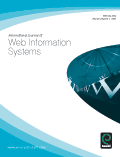
International Journal of Web Information Systems
Driving insights for a connected future.The International Journal of Web Information Systems is a distinguished publication dedicated to advancing the field of web information systems, offering a platform for high-quality research and innovative practices. Published by EMERALD GROUP PUBLISHING LTD in the United Kingdom, this journal has established itself as a vital resource for researchers, practitioners, and academics from various disciplines, particularly in Computer Networks and Communications and Information Systems, as evidenced by its ranking in the 2023 quartile assessments (Q3) and Scopus rankings. With an H-index reflecting its impact within the academic community and a publication window spanning from 2005 to 2024, the journal is committed to fostering scholarly exchange and collaboration. While it currently does not have open access options, it provides valuable insights and breakthroughs that are essential for professionals and students navigating the ever-evolving digital landscape.
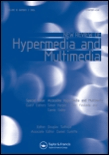
New Review of Hypermedia and Multimedia
Connecting Scholars to the Future of Media TechnologyThe New Review of Hypermedia and Multimedia, published by Taylor & Francis Ltd, serves as a vital platform for scholars and practitioners in the dynamic fields of computer science, media technology, and information systems. Established in 1995 and continuing through 2024, this journal explores the interplay of hypermedia and multimedia within digital environments. With an ISSN of 1361-4568 and an E-ISSN of 1740-7842, it has achieved noteworthy rankings, including a Q3 classification in Computer Science Applications and Information Systems, and a Q2 classification in Media Technology as of 2023. Additionally, it ranks 19th in Engineering Media Technology with a remarkable 70th percentile. While the journal maintains a subscription model, it performs a critical role in disseminating cutting-edge research and fostering innovation among researchers, professionals, and students alike. Aimed at enhancing understanding and application of hypermedia and multimedia technologies, this journal is an indispensable resource for those at the forefront of these evolving disciplines.

Journal of Location Based Services
Transforming Data into Location IntelligenceJournal of Location Based Services, published by Taylor & Francis Ltd, is a pivotal platform for the dissemination of innovative research in the domains of Computer Networks, Electrical and Electronic Engineering, and Signal Processing. With an ISSN of 1748-9725 and an E-ISSN of 1748-9733, this journal has been a cornerstone for scholars since its inception in 2007 and is set to continue until at least 2024. Its impactful contributions have established it as a respected publication, holding a Q3 ranking in Computer Networks and Communications, a Q2 ranking in Electrical and Electronic Engineering, as well as a Q3 ranking in Signal Processing for the year 2023. The journal's Scopus ranks reflect its standing within the academic community, achieving notable percentiles in various engineering domains. Although not currently open access, it remains a vital reference for researchers, professionals, and students who are shaping the future of location-based technology and its applications.
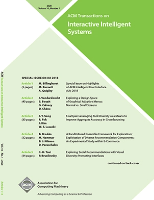
ACM Transactions on Interactive Intelligent Systems
Pioneering Research in AI and User-Centric Design.ACM Transactions on Interactive Intelligent Systems is a distinguished journal published by the Association for Computing Machinery (ACM), specializing in the realms of Artificial Intelligence and Human-Computer Interaction. With an impactful presence in the academic community, it boasts a respectable Q2 quartile ranking in both fields as of 2023, highlighting its significant contributions to advancing interactive intelligent systems. The journal, identified by ISSN 2160-6455 and E-ISSN 2160-6463, encompasses a broad spectrum of research from theoretical advancements to practical implementations, offering invaluable insights for researchers, professionals, and students. The journal not only serves as a platform for innovative ideas and methodologies but also emphasizes the importance of interdisciplinary approaches in its publications. Positioned in the United States, at 1601 Broadway, 10th Floor, NEW YORK, NY 10019-7434, it stands out for its commitment to quality, rigor, and relevance within the computing and interactive systems sectors.

International Journal of Digital Multimedia Broadcasting
Illuminating the Path of Multimedia AdvancementsThe International Journal of Digital Multimedia Broadcasting is a leading scholarly platform dedicated to the interdisciplinary exploration of digital multimedia broadcasting, published by HINDAWI LTD. With an ISSN of 1687-7578 and an E-ISSN of 1687-7586, this Open Access journal has made significant strides since its inception in 2008, ensuring wide accessibility and dissemination of research. Based in the United States, at Adam House, 3rd Flr, 1 Fitzroy Sq, London W1T 5HF, England, the journal covers a range of topics relevant to Communication, Electrical and Electronic Engineering, and Media Technology, boasting impressive Scopus rankings that highlight its influence in these fields. As part of the Q3 category in Communication and Electrical Engineering, and Q2 in Media Technology for 2023, the journal serves a vital role in fostering the understanding of technological advancements and their applications in multimedia broadcasting. Researchers, professionals, and students are encouraged to contribute to and benefit from the journal's rich repository of knowledge, paving the way for innovative developments in this dynamic industry.
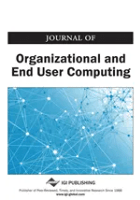
Journal of Organizational and End User Computing
Transforming Understanding of Human-Computer Interaction in OrganizationsThe Journal of Organizational and End User Computing, published by IGI Global, is a leading peer-reviewed outlet dedicated to exploring the intersection of organizational practices and user interfaces within the digital realm. With a robust ISSN of 1546-2234 and an E-ISSN of 1546-5012, the journal has established itself as a crucial resource for scholars and practitioners in the fields of Computer Science Applications, Human-Computer Interaction, and Strategy and Management. Recognized for its quality, the journal attained Q3 status in Computer Science Applications and Human-Computer Interaction, and Q2 status in Strategy and Management in 2023, reflecting its esteemed position in academic rankings. Operating from the heart of the United States, the journal has converged its focus from 2004 to 2024, making it a reliable source for cutting-edge research and industry trends. Although it does not offer open access, the Journal of Organizational and End User Computing remains an invaluable repository of knowledge, perfect for researchers, professionals, and students seeking to advance their understanding of organizational structures and user engagement in computing environments.
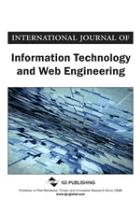
International Journal of Information Technology and Web Engineering
Connecting Academia with Practical InsightsInternational Journal of Information Technology and Web Engineering, published by IGI GLOBAL, is a pivotal platform for the dissemination of cutting-edge research in the fields of information technology and web engineering. With its ISSN 1554-1045 and E-ISSN 1554-1053, this journal has been effectively contributing to the academic landscape since its inception in 2006, aiming to bridge theoretical frameworks and practical applications in an increasingly digital world. As a recognized Q3 journal in the realm of Computer Science (miscellaneous), it ranks 122 out of 232 in Scopus' classification, positioning it amidst the active discussions and developments within the IT and web engineering communities. The journal not only serves as an invaluable resource for researchers and educators but also encourages students and practitioners to explore innovative methodologies and technologies that shape the future of the digital landscape. Although it is not currently an open-access journal, its contributions are indispensable for advancing knowledge and fostering collaboration within the global research community.

Journal on Multimodal User Interfaces
Unveiling the Dynamics of Multimodal CommunicationJournal on Multimodal User Interfaces, published by Springer, serves as a vital platform for scholarly exchange in the rapidly evolving fields of Human-Computer Interaction and Signal Processing. Established in 2008 and continuing through 2024, this journal maintains a high profile in academia, currently ranking in the Q2 category for both fields, indicating its significant contribution to ongoing research and practical applications. With its Scopus rankings placing it at #34 in Signal Processing and #49 in Human-Computer Interaction, it is recognized for publishing high-quality, impactful research. Although it is not an Open Access journal, the Journal on Multimodal User Interfaces remains accessible through institutional subscriptions. Researchers, professionals, and students will find the journal an essential resource for advancing knowledge and fostering collaboration in multimodal interaction technologies, which are crucial for enhancing user experience and developing intelligent systems.